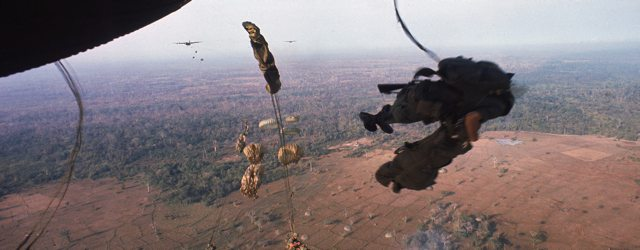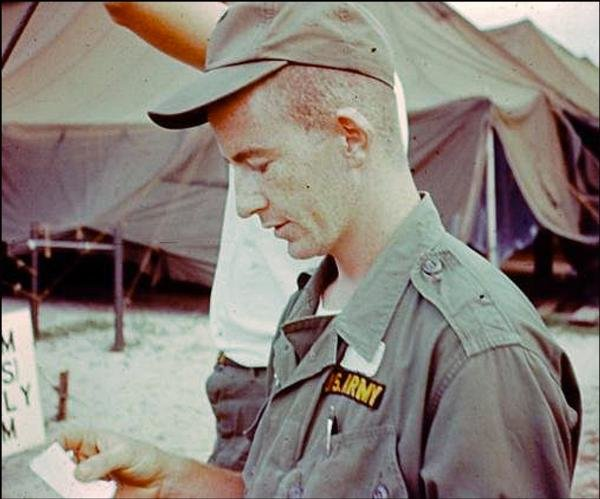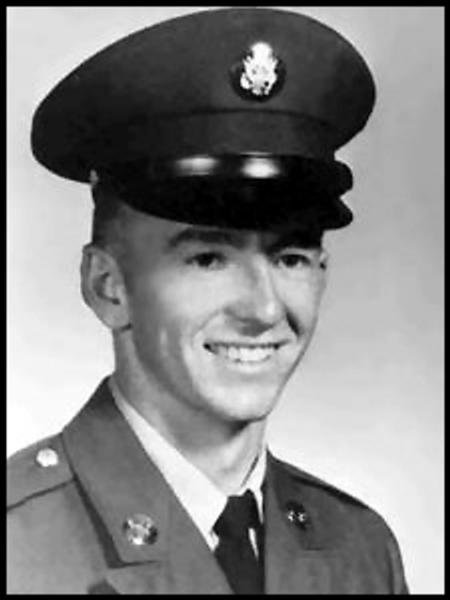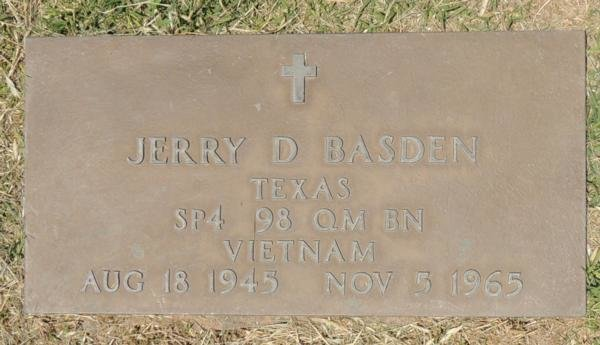Specialist Four Jerry Don Basden United States Army
“He died doing the work that sustained others — a rigger, a soldier, and a brother lost to the sky.”
November 5, 2025

 Specialist Four Jerry Don Basden
Specialist Four Jerry Don Basden
United States Army1st Logistical Command – 98th Quartermaster Battalion
Born: August 18, 1945 – Dumas, Texas
Died: November 5, 1965 – Offshore, South Vietnam (Qui Nhon)
Entered Service: Regular Military
Cause: Non-Hostile – Parachute Accident
Decorations: ★ National Defense Service Medal ★ Vietnam Service Medal
A Texas Boy with a Purpose
Jerry Don Basden grew up in the small Panhandle town of Dumas, Texas — a place defined by open skies, hard work, and quiet faith. Born on August 18, 1945, just days after the guns of World War II fell silent, he belonged to a generation raised in the long shadow of that victory. The nation was confident, prosperous, and proud, but its sons were still being called to serve around the world.
Those who knew Jerry Don remembered him as friendly and thoughtful — a young man with a sense of humor, a sense of duty, and a fascination with how things worked. He wasn’t one to seek the spotlight. Like many boys from rural Texas, he grew up knowing that service wasn’t about attention; it was about contribution.
By the time he came of age, the Cold War had grown hot in Southeast Asia. The headlines from Vietnam began to shift from “advisors” to “battalions,” and from “limited operations” to “active combat.” When the call came, Jerry Don answered without hesitation. He enlisted through Regular Military service — not through the draft, but by choice. That decision said everything about his character.
The Rigger’s Creed
When most people think of airborne troops, they picture paratroopers falling from the sky. But behind every jump, there were the parachute riggers — specialists whose unseen work kept the entire airborne system alive. They were the craftsmen of trust.
A rigger’s motto, known throughout the Army, is simple:
“I will be sure always.”
That creed wasn’t poetry. It was survival. Every pack job, every inspection, every folded canopy represented a life depending on their skill. Riggers were trained not just to pack parachutes, but to believe in them. The tradition held that every rigger should be willing to jump any parachute they packed. Confidence, competence, and courage — all in one bundle of nylon and cord.
For Specialist Jerry Don Basden, that trust was sacred. Serving with the 98th Quartermaster Battalion, part of the 1st Logistical Command, he was responsible for maintaining and delivering the gear that made airborne operations possible. From static lines and reserve chutes to cargo drops supplying units deep in the field, riggers were the unseen backbone of combat readiness in Vietnam.
he was responsible for maintaining and delivering the gear that made airborne operations possible. From static lines and reserve chutes to cargo drops supplying units deep in the field, riggers were the unseen backbone of combat readiness in Vietnam.
Their work took place far from the glory of battle, but never far from danger. The equipment they handled had to function flawlessly in tropical humidity, salt air, and monsoon winds. A single mistake could mean tragedy.
The Training Jump – November 5, 1965
It was a clear day off the coast near Qui Nhon, South Vietnam — November 5, 1965. The sea shimmered in the sunlight, the kind of deceptive calm that made everything seem routine. Specialist Basden and his fellow soldiers were conducting a training parachute jump over the South China Sea, leaping from roughly 3,800 feet.
It was a standard exercise meant to maintain proficiency. The jump team lined up inside the helicopter, each man clipped in, each static line checked — or at least, it should have been. As the aircraft reached altitude, one by one, the soldiers exited the door, disappearing into the blue below.
Jerry Don Basden was the last man to jump.
When he stepped out, something went wrong. His static line — the cord that automatically deploys the parachute when the jumper exits — became looped beneath his arm. In that split second, as the line tightened and the canopy deployed, the tension sliced across his neck and severed his jugular vein.
The parachute opened perfectly. But Jerry Don was already mortally wounded before he ever reached the ocean surface below.
Those who witnessed the jump said he drifted down normally, his body still attached to the open chute. The reports later listed his cause of death as drowning, because that was the point of discovery. But his fellow riggers knew the truth — that he died in the air, struck down by an error that should never have happened.
It was later determined that the jumpmaster had failed to properly check his line, a devastating oversight in a profession built on precision.
A Tragedy Among Brothers
The loss of Specialist Basden shook the men of the 98th Quartermaster Battalion. In Vietnam, every soldier accepted risk from enemy fire — but to lose a brother in a non-hostile accident, especially one so preventable, was harder to bear.
The rigger community is small, tight-knit, and defined by a shared standard. When one is lost, the others carry that weight. For the men stationed near Qui Nhon, Jerry Don’s death became a painful lesson in vigilance and accountability. His accident wasn’t just another statistic — it was a reminder of the fragile line between life and loss in a place where even training could become fatal.
He was only 20 years old.
The Cost of the Quiet Professions
There are roles in the military that rarely make the headlines — yet without them, the entire machine of war would collapse. Parachute riggers, mechanics, medics, cooks, and logisticians — the ones who “keep the sky open” and the front line supplied — form the invisible scaffolding of every operation.
Specialist Jerry Don Basden belonged to that world of quiet professionalism. His service may not have been on the front page, but it mattered deeply. Every successful supply drop, every safe airborne insertion, every life saved because a parachute opened as it should — that was his legacy.
The military calls accidents like his “non-hostile losses.” But anyone who has ever served knows that “non-hostile” does not mean “without cost.” The danger was ever-present. The courage, too.
The Homefront Grief
Back in Dumas, Texas, word of Jerry Don’s death reached his family like a storm breaking across still water. The Basdens were part of a close-knit community where neighbors rallied to support each other. For them, the telegram that arrived that week was not just official notice — it was the shattering of a dream, the loss of a son barely grown.
1965 was still early in America’s involvement in Vietnam. The war had not yet reached its later ferocity, and many families still believed their boys would come home soon. For the Basdens, that hope ended in a sentence that began with “The Secretary of the Army regrets to inform you...”
He had gone overseas to serve, to build, to sustain — and in the course of that service, he gave everything.
“He Died Doing the Work That Sustained Others”
It is easy to overlook men like Jerry Don Basden when telling the larger story of Vietnam. There are no famous battles attached to his name, no heroic dispatches from the field. Yet his story carries something profound — the kind of courage that lives quietly behind the scenes.
He was doing his job, fulfilling the creed of his trade, and trusting in the system built by brotherhood and discipline. That trust cost him his life. But it also defines why he is remembered.
“He died doing the work that sustained others.”
Those words are not a eulogy — they are a truth. Every soldier, paratrooper, and aircrew who relied on their parachutes in Vietnam owed their safety to men like him. His death became part of that sacred exchange: the unseen sacrifice that made others’ missions possible.
The Legacy of the 98th Quartermaster Battalion
The 98th Quartermaster Battalion had a demanding mission — supplying and maintaining the logistics pipeline for U.S. and allied forces across South Vietnam. Based near major port cities like Qui Nhon and Cam Ranh Bay, they handled everything from parachutes and aerial delivery systems to critical supplies for airborne and Special Forces units operating deep inland.
As the war expanded, so did their responsibilities. Cargo drops over contested territory, nighttime resupply missions, and emergency re-rigging of damaged parachutes became daily challenges. Within that environment, riggers like SP4 Basden worked long hours in heat and humidity, often sleeping beside the same equipment they packed.
Their precision saved countless lives.
Today, historians and surviving veterans of the 98th remember him as one of their own — not just a name in a report, but a brother lost in the line of duty, whose accident underscored the danger inherent in every aspect of their service.
Symbols of Honor
Specialist Basden’s service was recognized with the National Defense Service Medal and the Vietnam Service Medal — honors that represent both his commitment and the era in which he served. But no ribbon or medal can capture the quiet dignity of what he gave.
The riggers’ creed ends with the words:
“I will be sure always — for I have packed the parachute that others must trust with their lives.”
For Jerry Don Basden, those were not just words. They were the core of who he was.
Eternal Rest
He was laid to rest with full military honors, his service remembered by those who loved him and those who served beside him. Though he perished far from home, the wind and sea that carried him down that day are the same elements that cradle every aviator, paratrooper, and soldier who risks the skies.
In remembering him, we also remember the hundreds of men and women lost to accidents — the “non-hostile” dead whose sacrifices remain every bit as sacred as those lost in combat.
Each one of them reminds us that the price of freedom isn’t only paid in battle. It is paid in preparation, in training, and in the quiet labor of those who ensure that others can return home alive.
Epilogue: A Brother Lost to the Sky
It has been six decades since the day Jerry Don Basden’s parachute blossomed over the South China Sea. Time has softened the pain, but not the meaning. His story endures — not as tragedy alone, but as testimony to the devotion of those who served where danger was invisible yet ever-present.
When paratroopers take to the air today, they still whisper the same creed. They still trust the hands of the riggers who pack their chutes. And in that trust, men like Jerry Don Basden live on.
He was a rigger, a soldier, and a brother — lost to the sky, but never forgotten.
“For every man who fell, another carried on. The mission endures. The memory remains.”
— Ghosts of the Battlefield